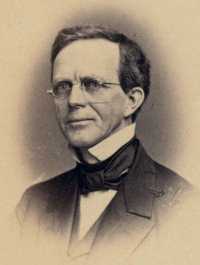Home | News | Books | Speeches | Places | Resources | Education | Timelines | Index | Search
Library of CongressLetter to Lyman Trumbull
Like Abraham Lincoln, Lyman Trumbull moved to Springfield, Illinois, in the 1830s, established a law practice, and became active in politics. When he married Julia Jayne in 1843, Mary Lincoln was a bridesmaid. As a Democrat, Trumbull differed with Lincoln on many issues but joined him in opposing the 1854 Kansas-Nebraska Act, which repealed the Missouri Compromise. Both men became members of the newly formed Republican Party soon afterward, and Trumbull supported Lincoln in the 1858 U.S. senate race.This letter is a response to Trumbull's inquiry about Lincoln's 1860 presidential intentions. Lincoln here confesses that "the taste is in my mouth a little." One month after the letter was written Lincoln surprised many political observers by winning the Republican Party presidential nomination.
Springfield, Illinois
April 29, 1860Hon. L. Trumbull:
My dear Sir:Yours of the 24th. was duly received; and I have postponed answering it, hoping by the result at Charleston, to know who is to lead our adversaries, before writing. But Charleston hangs fire, and I wait no longer.
As you request, I will be entirely frank. The taste is in my mouth a little; and this, no doubt, disqualifies me, to some extent, to form correct opinions. You may confidently rely, however, that by no advice or consent of mine, shall my pretentions [sic] be pressed to the point of endangering our common cause.
Now, as to my opinions about the chances of others in Illinois. I think neither Seward or Bates can carry Illinois if Douglas shall be on the track; and that either of them can, if he shall not be. I rather think McLean could carry it with D. on or off -- in other words, I think McLean is stronger in Illinois, taking all sections of it, than either S. or B; and I think S. the weakest of the three. I hear no objection to McLean, except his age; but that objection seems to occur to every one; and it is possible it might leave him no stronger than the others. By the way, if we should nominate him, how would we save to ourselves the chance of filling his vacancy in the Court? Have him hold on up to the moment of his inaugeration [sic]? Would that course be no draw-back upon us in the canvass?
Recurring to Illinois, we want something here quite as much as, and which is harder to get than, the electoral vote -- the Legislature. And it is exactly in this point that Seward's nomination would be hard on us. Suppose he should gain us a thousand votes in Winnebago, it would not compensate for the loss of fifty in Edgar.
A word now for your own special benefit. You better write no letters which can possibly be distorted into opposition, or quasi opposition to me. There are men on the constant watch for such things out of which to prejudice my peculiar friends against you. While I have no more suspicion of you than I have of my best friend living, I am kept in a constant struggle against suggestions of this sort. I have hesitated some to write this paragraph, lest you should suspect I do it for my own benefit, and not for yours; but on reflection I conclude you will not suspect me.
Let no eye but your own see this -- not that there is anything wrong, or even ungenerous, in it; but it would be misconstrued.
Yours friend as ever
A. Lincoln
Source: Collected Works of Abraham Lincoln, edited by Roy P. Basler et al.
Home | News | Education | Timelines | Places | Resources | Books | Speeches | Index | Search Lincoln's writings are in the public domain; this introduction copyright © 2022 Abraham Lincoln Online. All rights reserved. Privacy Policy

